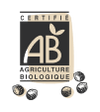Why buy organic seeds?
1. Organic from seed to plate
For many consumers, eating organic is important for their health and the environment. For gardeners, this often means avoiding chemical treatments. Vegetables from the garden will therefore be "healthy" since they contain no chemical residues. But in a sustainable environmental protection approach, using "conventional" seeds doesn't make sense. Indeed, during the production of so-called "conventional" seeds, plant protection products are regularly used. These products leave residues in the soil, water, and possibly in the seeds.
Using conventional seeds therefore partly means endorsing their production method. Organic seeds are generally more expensive, of course. But this price is linked to the additional cost generated by the organic production method. Technically, organic seed production is more difficult and riskier. Buying organic seeds therefore affirms your desire to eat organic from seed to plate, but also protects the environment.
2. Conventional, organic, untreated seeds: what’s the difference?
For several years now, alongside "classic" or conventional seeds, organic and untreated seeds have become commercially available. These three categories are linked to different production methods.
Conventional seeds are propagated using a "classic" production method. The crop is protected and weeded with plant protection products. Once harvested and sorted, the seeds are generally treated to facilitate their conservation, to protect them from soil pests and diseases, or to make them easier to sow. These seeds are often colored (red, green, blue, depending on the supplier and the products used). These colored seeds are particularly found among professionals. Seeds for individuals can also be treated to improve their conservation, without this being visible on the seed.
Untreated (or NT) seeds are also produced in a conventional system. The seed plant can therefore be treated: only the seed has not undergone any chemical treatment after harvest. The production of these seeds therefore has a reduced environmental impact. They can be used, with an exemption, by organic producers in the event of a shortage of organic seeds.
Organic seeds are propagated using organic production methods. Therefore, no phytosanitary treatments are used. Their production therefore has almost no impact on the environment. In some cases, the seeds may be "treated" by exposing them to cold or hot water to eliminate certain small pests and diseases present on the surface of the seeds. They must be used by organic farmers (unless otherwise specified).





